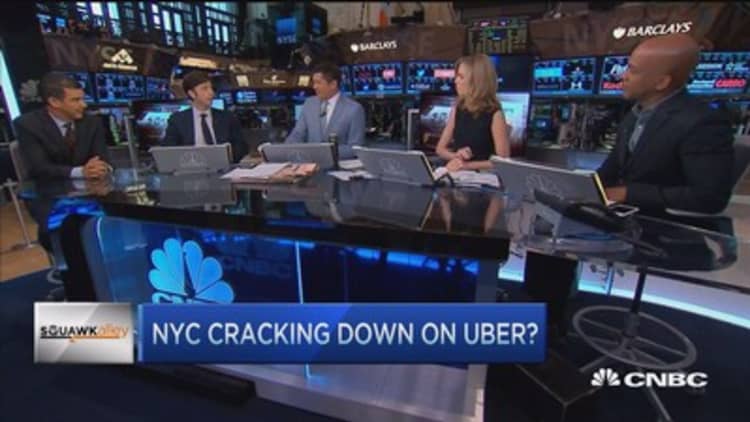Tech start-ups use customer information for all sorts of commercial purposes, but some customers of Uber in parts of New York City recently discovered a possibly novel use.
The $50 billion ride-sharing company blasted emails to Brooklyn customers last week attacking a bill being heard Tuesday in New York City Council that stands to cap the number of for-hire vehicle licenses issued by the city for an environmental study. (Uber says the bill is nothing more than a revamped version the taxi industry pushed for three months ago.)
The company even offered free rides to the protest and provided a pre-drafted message for customers to forward to the bill's author—City Council Member Stephen Levin—informing him that they are "angered to learn" about the bill's limits and to urge the council to "withdraw this bill today." (Tweet This)
If it were any other company it might not flag much attention, but when it's Uber—a company that previously drew fire after a corporate exec suggested the company could help dig up dirt on a critical female journalist—a novel use of customer data will be more scrutinized.
Read More A cap on the number of Uber cars in NYC?
Levin said he's seen an uptick in the number of emails he's received and has heard complaints from his constituents. "I've heard from people who are concerned that they were contacted when they didn't sign up for this type of activity," he said.
Uber says there's nothing wrong with its move. "It is not uncommon to email riders and driver-partners based on neighborhood," the company said, "whether it is to inform them of a targeted promotion in their area or of action taken by their elected officials." It's easy for the company to do since it's always tracking the geolocation of users in order to book them a car.
Read MoreA governor who chose to ride with Uber over regulators
An Uber spokesman pointed to a recent promotion that targeted New Yorkers impacted by a subway closure between Brooklyn and Manhattan as one such example.
But consumer security expert and CEO of cybersecurity firm SnoopWall, Gary Miliefsky, says using personal customer data such as names, zip codes and geolocation for political reasons might be taking things a step too far. "They need to know where you are for your ride, not to know who to send political documents to," he said. "And why hold on to that data when there is a chance a hacker could gain access to it? Can we at least be up front and clearer with the privacy risk we are putting customers at?"
Uber's privacy policy doesn't mention anything specifically about political announcements. When CNBC raised the question an Uber spokesman pointed to a section noting Uber can use the data it collects "to customize your experience with the services, or to serve you specific content that is most relevant to you."

Uber also said that it will issue a more transparent Privacy Policy in the coming weeks after commissioning an external review. The new statement clearly points out the app will seek access to a rider's location and contacts even when the app is running in the background. Users would be allowed to opt out of that data collection, but it wasn't clear if the company would maintain its old policy on receiving promotional messages: always receive them or deactivate your account.
"I think Uber would take the high road if they wanted to, but they know how valuable that data they are grabbing on everyone can be and how much that adds to their value," Miliefsky said.
Levin said he's never used Uber and hasn't given much thought about any data they might have on him. Now some of his constituents' data is helping the company rally public sentiment against the proposed cap on Uber's drivers in New York City.


